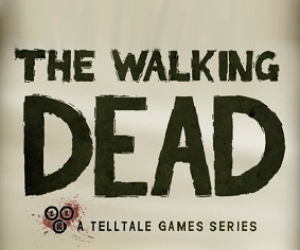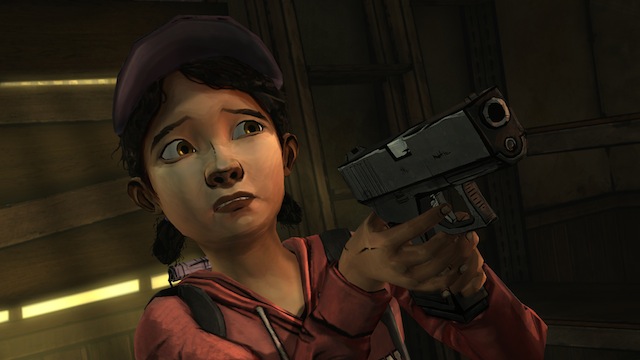The Walking Dead: Episode Three – Long Road Ahead Review
 Game: The Walking Dead: Episode Three – Long Road Ahead
Game: The Walking Dead: Episode Three – Long Road Ahead
Developer: Telltale Games
Publisher: Telltale Games
Available on: Xbox LIVE Arcade, PlayStation Network, PC and Mac
Reviewed on: Xbox 360
When we last joined our group of zombie apocalypse survivors in Episode Two, things took a new and dramatic turn, and nerves were really strained amongst the protagonists. We thought that Episode Two was really pushing the boundaries of what we should expect from the series, but be prepared to re-think everything once again, as Episode Three packs an even bigger punch. There are some truly shocking events and twists that go down and this is one game that will leave a real emotional impact.
After the events in ‘Starved for Help’, the group is both smaller and more disparate than ever before. Trust is at an all-time low, with Lily separating herself from everyone else after her loss in Episode Two. Lee is still trying to keep them all together, but one camp wants to stay put, whilst the other wants to hit the road and head for the coast. To make things worse, bandits are threatening the safety of the group, and someone seems to be working with the bandits, secretly supplying them with some of the rations and medication from the groups’ stash. Understandably, the stress and paranoia comes to a head and it is finally time for the group to head for a safer location. However, the road certainly doesn’t run smoothly, with shocking repercussions and the player will have some massive choices to make.

The only problem, is that sometimes the choices only seem like they change things on the surface, or temporarily, and in the end, the vision of the storytellers is still the priority. For instance, you may choose to save one character, but it seems fated that the particular one you save won’t play an important part in the series eventually, as they weren’t intended to definitely be there. This could lead to the player thinking that their choices are only skin deep. There are different levels of choice though, so some are more major than others, and you will soon forget about any which have irritated you previously, as the game is so involving and unrelenting.
What remains one of the constant factors throughout all of the episodes so far, and what is clearly the heart of the series, is the partnership between the hero Lee and the little girl he rescued on day one, Clementine. Even when the rest of the group is falling apart and some really terrible events unfold, somehow you have to make sure that Clementine keeps hold onto hope, and that you protect her as best as you can. ‘Long Road Ahead’ sees her character developed more than before as you have to prepare her to not only hide, but to fight for herself. Amazingly, Telltale have created some characters that you do have strong feelings for, and when something does happen to one of them, it does make a strong emotional impact on you. I don’t know what higher praise to give to the writers of this series.
Unfortunately, the graphical errors and slow-down that has intermittently effected the series up to this point rear their head again for Episode Three, and more noticeably than before. Frame-rate issues are a real bug-bear with Telltale games, and this did occur more frequently in ‘Long Road Ahead’, and somewhat breaks up the flow of the title. There are also several occasions where background graphics will flicker, or objects appear in a scene later than they should. These problems do drop in and out, so are by no means a constant issue, and admittedly the severity of these errors seems to differ somewhat from player to player. For instance, some people reported major slowdown in Episode Two, and other players did not. Regardless, it remains an issue across all Telltale titles, so should be a top priority in future games.
The difficulty curve that began to spike last time around also ratchets up a little further, with many of the quick-time events that crop up requiring some really quick reactions to avoid an untimely death. Adventure game fans who don’t like action beware, the game actually features shooting sections. In a real departure for Telltale, there are two occasions in the game where the player is given a targeting reticule and has to aim their own shots against the zombie horde. This isn’t deep though, and you aren’t free to roam around like in a FPS, but it is an interesting new aspect to the gameplay, and it certainly helps add to the feeling of danger and panic. Even gamers who prefer the relaxed pace of adventure games need not be put off by the shooting segments, they are well-checkpointed and make up only a very small portion of the game.
The other main gameplay change is that there are actually a couple of more traditional adventure game puzzles this time around. Whereas other episodes have perhaps been largely conversation and quick-time event based, there are a couple of big puzzles to be solved in Episode Three. They aren’t particularly taxing, so you won’t need a hint system, or to resort to walkthroughs, but set in contrast to the gunplay, it shows that Telltale are trying to add some variety into the series, rather than having all episodes feel too similar.

VERDICT: Although it must be said that the faults of the series aren’t being addressed as we go from one episode to the next, the story-telling in the series is just getting better and better with each instalment. The fact that both your own actions, and those of the other characters, can elicit such strong emotional responses in the player is very impressive and shows just how well the game has been put together. If you play ‘Long Road Ahead’ and don’t have some feelings of guilt or remorse, then I would start to question your moral compass. That is just what The Walking Dead does, it tests your morals, your judgement and your heart. What would you be willing to do to survive and just how far would you go?
It cannot be ignored that at the end of every episode, you simply can’t wait to play the next one, and to carry on the journey. The fact that the game can successfully respond and be moulded by your choices, makes this an experience unlike any other in gaming so far. This is the kind of game we all imagined when we were young. Wouldn’t it be great if what you did in-game, actually impacted how the game progressed? Telltale may not have made the definitive version, and some choices are obviously far more superficial than others, which can be irritating, but, if some of the ideas in the series manage to rub off on other creative forces in the industry, this could be the start of a revolution in gaming.






